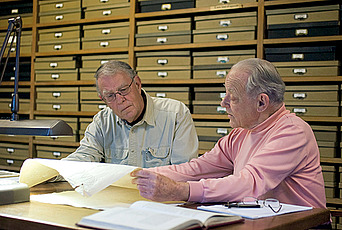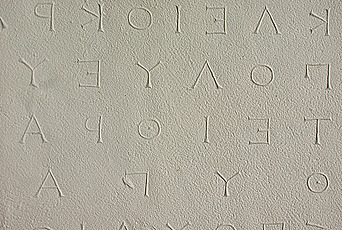Christian Habicht (1926–2018), Acclaimed Historian and Leading Expert on the Hellenistic Period, Dies at 92
Press Contact

Christian Habicht, a celebrated historian of the Hellenistic period and leading authority on Greek epigraphy, died at the age of 92 on the morning of August 6, 2018, in Princeton, New Jersey. He was Professor Emeritus in the School of Historical Studies at the Institute for Advanced Study, where he served as Professor from 1973 until he retired in 1998.
Habicht’s remarkable contributions to ancient history shed light on Athenian society in the centuries between the fall of the Athenian Empire and the establishment of the Roman Empire.
“The Institute has lost an extraordinary scholar, mentor, collaborator, and dear friend,” said Robbert Dijkgraaf, Director and Leon Levy Professor. “Professor Habicht possessed an exceptional depth of knowledge that he cultivated and shared throughout his life. His scholarship illuminated the past and greatly increased our understanding of humanity. Together with his wife Freia, he was a dedicated member of the Institute community. We can be proud that he regarded us as his intellectual home. He will be deeply missed.”
Angelos Chaniotis, Professor of Ancient History and Classics, stated, “With his studies on Athenian elite families from Alexander to Cleopatra, Christian Habicht redefined the study of Athenian history. His book on the Hellenistic ruler cult is such an unsurpassed scholarly achievement that an English translation was published 60 years after its first edition. Although Christian Habicht hated to be in the center of attention, his research of more than 60 years has placed him in the center of scholarly attention in a variety of fields, from Greek society to Hellenistic royalty, from the traveler Pausanias to the orator and statesman Cicero, and from the epigraphy of Thessaly and Asia Minor to Greek religion. He was also a pioneer in the use of electronic media in epigraphic and prosopographical studies. His published work is of lasting value and will remain an inspiration for ancient historians.”
During his tenure at the Institute, Habicht welcomed colleagues from all over the world and assiduously championed their work, providing insights that will continue to inform scholars for generations to come. At a 2006 symposium in Athens celebrating Professor Habicht’s 80th birthday, Stephen V. Tracy, a former director of the American School of Classical Studies at Athens and a frequent Member and Visitor in the School of Historical Studies, recalled, “It is no exaggeration to say in my own case that Christian Habicht not only facilitated my work, he literally enabled me to continue it when it had been stalled for years because of the impossibility of working here in Athens.” Tracy added, “Doubtless all of you could tell similar tales of Professor Habicht’s generosity and kindness, not to mention his brilliance.”
Habicht was born in 1926 in Dortmund, Germany. He received his Ph.D. in Ancient History in 1952 from the Universität Hamburg where he held positions from 1952 to 1961. He then served as a Professor (1961–65) at the Philipps-Universität Marburg. Prior to joining the Institute as a Member in the School of Historical Studies in 1972–73 and being appointed Professor in the School in 1973, Habicht was Professor (1965–73) and Dean of the Faculty of Arts (1966–67) at the Universität Heidelberg. Explaining what led him to Greek epigraphy, Habicht observed, “To me, epigraphy came naturally with research for my doctoral dissertation. The field is much larger than editing inscriptions and commenting upon them; it provides fertile soil for all kinds of social and economic studies, for onomatology, dialectology, grammar, for religion and ritual, and so much more.”
On joining the Institute Faculty, Habicht assumed responsibility for the extensive collection of squeezes that Benjamin D. Meritt, then Professor in the School of Historical Studies, had amassed to form a major research center in Greek epigraphy at the Institute. In 2010, Habicht wrote, “The total number of squeezes from the Epigraphical Museum [in Athens] amounts to 8,532 pieces in the IAS collection. It is rivaled only by those from the Athenian Agora.” He added, “The total of the Institute’s collection comes to some 25,000 squeezes and makes it in fact ‘second only to that in Berlin.’” This was a moderate estimate of the catalogue of squeezes, which today is the basis for a digitization project that will make the collection freely accessible online.
Habicht authored books on Hellenistic ruler cults, on the Maccabees, on Cicero, and on Pausanias, and he was the editor of hundreds of previously unpublished inscriptions from the most important places in Greece and Asia Minor. One of his works, Athens from Alexander to Antony, published in 1997, was described by the New York Review of Books as “the standard work on the subject for the next thirty years.” Habicht’s work was recognized for its profound impact on formerly-held views. In a passage from Athens from Alexander to Antony, he writes, “An old and widespread view, still current among some scholars, holds that the outcome of the Battle of Chaeronea in 338 B.C.E. spelled the end of ‘the Greek city.’ However, a large and constantly increasing body of unambiguous evidence from Hellenistic inscriptions has proved this erroneous without a doubt…these cities as well as hundreds of smaller communities remained viable and vital political organisms.”
Habicht’s more than two hundred articles cover topics from the fifth century B.C.E. to the fourth century C.E. He contributed the introduction and explanatory notes to a new bilingual edition of Polybius’s The Histories; the six volumes were published in 2010–12. An updated English edition of his doctoral dissertation, submitted in German in 1951, was published as Divine Honors for Mortal Men in Greek Cities: The Early Cases by Michigan Classical Press in 2017.
Habicht’s work was acknowledged with many awards, fellowships, and other honors during his lifetime, including appointments as the Sather Professor (1982) at the University of California, Berkeley, and Honorary Counsellor of the Archaeological Society of Athens (1998); the London Hellenic Society’s Criticos Prize (1997), the American Philosophical Society’s Henry Allen Moe Prize (1996), and the City of Pforzheim’s Reuchlin Prize in the Humanities (1991). He was a member of the Academy of Athens, the Academy of Heidelberg, the American Philosophical Society, the British Academy, and the German Archaeological Institute.
Habicht is survived by his wife, Freia Habicht; their daughter, Susanne Habicht [predeceased by husband Dündar Erenler] with children Yilmaz Erenler and Sahin Erenler; their son Christoph Habicht [predeceased by wife Vera] with children Daniel Habicht, Tobias Habicht and wife Lena Haug-Habicht with daughter Paula, Sofia Habicht, Sebastian Habicht, Johanna Habicht, and Alessandra Habicht; and their son Nik Habicht and wife Carol.


